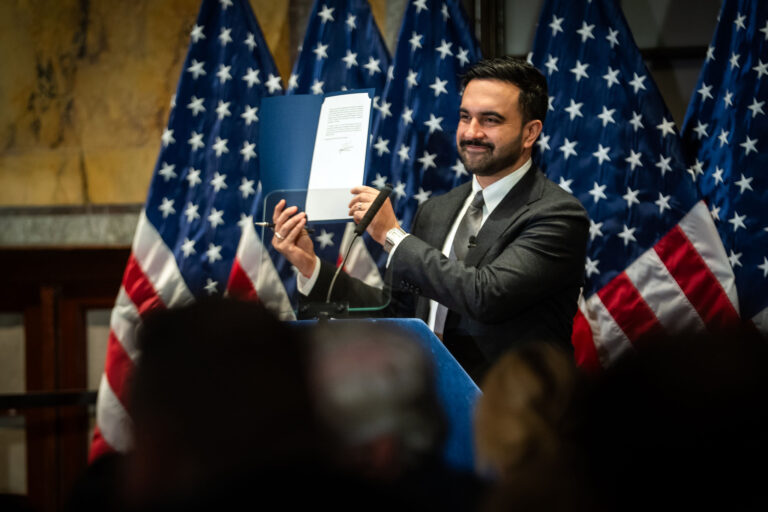New York adults over the age of 21 can now possess and use marijuana — even in public — under a legalization bill signed Wednesday by Gov. Andrew Cuomo, though legal sales of recreational-use cannabis won’t start for an estimated 18 months until regulations are set.
Passed after several years of stalled efforts, the measure makes New York the 16th state to legalize adult use of the drug, though South Dakota’s measure is in legal limbo.
New York becomes the second-most populous state, after California, to legalize recreational marijuana. Legalization backers hope the Empire State will add momentum and set an example with its efforts to redress the inequities of a system that has locked up people of color for marijuana offenses at disproportionate rates.
“By placing community reinvestment, social equity, and justice front and center, this law is the new gold standard for reform efforts nationwide,” said Melissa Moore, New York state director of the Drug Policy Alliance.
The legislation provides protections for cannabis users in the workplace, housing, family court, schools, colleges and universities, and sets a target of providing half of marijuana licenses to individuals from underrepresented communities. And police could no longer use the odor of cannabis as a reason for searching someone’s car for contraband.
New York will start automatically expunging some past marijuana-related convictions, and people won’t be arrested or prosecuted for possession of pot up to 3 ounces. A 2019 law already expunged many past convictions and reduced the penalty for possessing small amounts.
In a unique provision, New Yorkers 21 and over can now smoke cannabis in public, including on sidewalks. No other state allows that, said Paul Armentano, deputy director of pro-legalization group NORML.
Still, New Yorkers can’t smoke or vape marijuana in locations where smoking is prohibited by state law, including workplaces, indoor bars and restaurants and within 100 feet of a school. And stricter local smoking rules apply: New York City bans smoking in parks and on beaches, for instance.
Local governments can pass stricter rules on marijuana use, prohibit retail dispensaries or cannabis lounges, and impose small civil penalties — as long as they don’t “completely or essentially prohibit a person” from lawful marijuana use.
Mackenzie Stevenson, a portrait photographer and dental assistant in central New York, was thrilled at the news. She has a relative with epilepsy who’s been greatly helped by medical marijuana.
“I’ve seen the benefits it’s had for her, so I’m excited for more people to be able to benefit from it,” the 20-year-old said.
“Once I’m 21, I’m going to be very excited to go out and be able to use it myself,” added Stevenson, who said she has tried it occasionally.
Law enforcement organizations, parents’ groups and many Republican lawmakers opposed the new law.
They suggested legalization will encourage kids to use marijuana and will increase impaired-driving crashes, among other concerns.
“For 27 years in the military, I fought drugs, every single year… What will we do to our children here?” Republican state Rep. John Lemondes Jr., a retired Army colonel, asked as lawmakers debated Tuesday night.
Legalization supporters say that it’s already easy for young adults to get pot and that there’s no clear link between marijuana legalization and traffic accidents. Officials plan to study the driving issue, and the law also lets state police get money to train more officers as “drug recognition experts,” though University at Buffalo professor R. Lorraine Collins said there’s no evidence those experts can tell whether someone’s high.
The trade publication Marijuana Business Daily estimates New York could become the East Coast’s largest recreational marijuana market — generating a potential $2.3 billion in annual sales by its fourth year.
Cuomo, a Democrat, said annual tax revenues could eventually total $300 million, though Republicans are skeptical. California was forced to cut $223 million from state budget projections in 2019 due to slower-than-expected pot sales.
After covering the state’s costs of regulation and enforcement, tax revenues would go to schools, drug treatment and prevention programs and a fund for investing in job skills, adult education, mental health and other services in communities that bore the brunt of the national and state drug war.
The taxes are considerable: a 9% statewide sales tax, an additional 4% county and local tax and another tax based on the level of THC, marijuana’s active ingredient.
Sen. Liz Krueger, a Democrat and the legislation’s senate sponsor, estimates the total tax rate will come out to about 20%.
The state will provide loans, grants and incubator programs to encourage cannabis entrepreneurs from minority communities, as well as small farmers, women and disabled veterans. Krueger said the state can’t mandate giving 50% of licenses to such applicants because it could be unconstitutional.
Instead, the law sets 50% as “a goal.”
“Fifty percent is a very high bar to try to reach, but if it happens, it would be amazing,” said Hillary Peckham, chief operator of Etain Health, a women-owned New York medical cannabis company that is considering applying for a recreational marijuana license.
“The next step is to see how the regulations and the program are stood up to actually provide those opportunities,” added Peckham, whose company has four dispensaries around the state.
Social equity emerged as a key theme in marijuana legalization in recent years, with newly legal states trying to build it in and others seeking to make up for a lack of diversity in the businesses they approved earlier. But plans haven’t always played out as intended.
Illinois, for instance, was touted for the equity provisions in its 2019 law. But that has drawn criticism and legal action from some Black-owned businesses that were passed over. Illinois has since revised its process to try to address those issues.
(AP)












One Response
“Wow, dude, like, where’s the Doritos?”